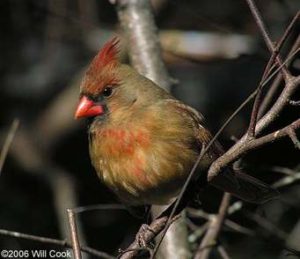 “This morning the redbird’s eggs/ have hatched and already the chicks/ are chirping for food. They don’t/know where it is coming from, they/ just keep shouting, ‘More! More!'”
“This morning the redbird’s eggs/ have hatched and already the chicks/ are chirping for food. They don’t/know where it is coming from, they/ just keep shouting, ‘More! More!'”
Mary Oliver wrote those lines, most likely on a summer morning, having observed cardinals nesting near her house. Although I never saw it, I knew that I too had a nest nearby. Because, early in October, cardinal fledglings started appearing on the branches near my feeder.
Although fully grown now, they are still hanging around their parents. They sit on a branch while an adult flies to the feeder and retrieves one sunflower seed. The parents alternate; both male and female feed their young. And unlike the hatchlings that Mary Oliver described, the young wait, patiently and silently. Sometimes the parent flies back immediately to feed the young. But more often than not, it will stay at the feeder for a minute or so, keeping the seed in its beak but not eating it. While the young bird waits, it flutters its wings, looking hungrily towards the feeder without making a peep. It’s clear it has learned to fly, if a bit clumsily, and could probably get to the feeder itself, but apparently it prefers Mom or Dad to feed it. So it just waits for the adult to return.
Already, at this early stage of life, the young bird is learning something important. While I can’t get inside their little bird heads to know this, it seems that the parent is teaching its young to be patient; something it will need in order to survive: to wait before flying out into the open if a hawk is overhead, to stay close to a tree trunk until the storm abates, to wait for food if it’s not immediately available.
I love that such an everyday observation of a natural phenomenon like this guides me to reflect on human activity. For starters, if I hadn’t waited by the window but hurried away to accomplish something “productive,” I would never have known about that particular behavior. Which led me to contemplate the way so many of our human young don’t seem to know how to wait: for a toy or a popsicle, a new iPhone or a ride to the mall. They are like the newly hatched chicks. Stuck in infancy they need to be fed right away. “They just keep shouting ‘More! More!’ ” And because of schedules or fatigue or their own impatience, it becomes tempting for parents to give in rather than wait it out.
“Instant gratification”: a motto for today. For everyone, not just children. So much to do, so many things to buy, so many people to see. Shopping, work, social media and more: all of these rob us of the opportunity to be still, to wait, to watch, to observe, to delight in small wonders; like a bird feeding its young.
I am at the time of my life when, by necessity, I go more slowly through my days. Rather than bemoan this reality, I hope to savor it as an advantage of aging. Walking more slowly, I can take the time to stop and relish things that I would have passed right by in my haste to get on to the next activity. Lacy spiderwebs, neon green lichen, fantastic fall colors. A young father teaching a child to ride a bike, a gaggle of high school girls full of talk and energy, a fabulous vintage MG parked down the street. I wish I had known this sooner. Whatever your age or stage of life, I invite you to simply remember the cardinals; how they trust that by waiting, they will be rewarded.

One Response
Hi Polly,
How timely to read your post. I have so enjoyed
The Mom and Dad Cardinals feeding their young
Recently at my feeders. AND, yes, I have really noticed
How patient the young are. What a joy to see, and what
A special reminder to slow down.
Thank you!
Hoping to see you soon at yoga. I’ve missed you.
Cousin Dot